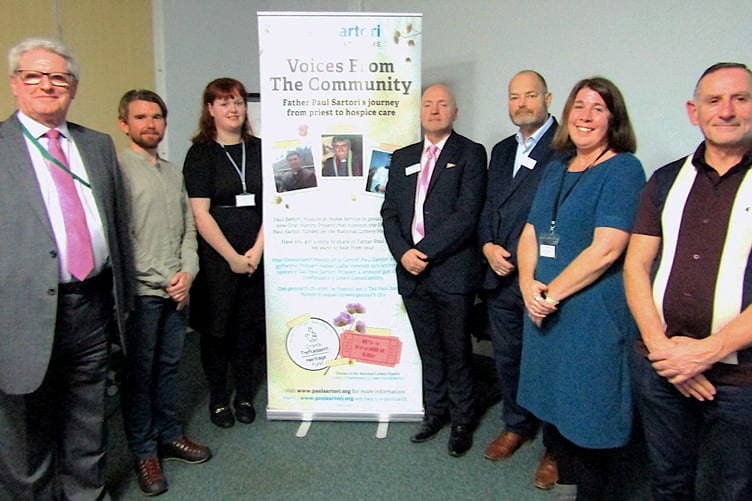The Paul Sartori Hospice at Home charity held a celebration at Pembrokeshire Archive following its 19-month long oral history project which captured precious memories of the man who inspired it.
The charity’s history project officer, Simon Hancock said he was thrilled to welcome staff, trustees, volunteers, interviewees and supporters on such a special occasion.
The official title of the project was ‘Voices from the Community – Father Paul Sartori’s journey from priest to hospice care’ and was the brainchild of the charity’s grant development officer Judith Williams.
Father Sartori was a Haverfordwest-based parish priest who identified a need for hospice care in Pembrokeshire but died of cancer at the age of 39 before his dream could be realised. Inspired by his vision, parishioners and friends formed the Paul Sartori Foundation 40 years ago.
Speaking to a packed room, Simon explained: “This has been an extraordinary journey of discovery over the past 19 months. It’s a matter of no small regret that we contemplate the end of the road.
“We were keen to identify people who had personal memories of Father Paul Sartori – this young, dynamic, charismatic Catholic priest who inspired the charity which bears his name today. We wanted to record those precious memories, and record them as a permanent record for future generations. These memories were so varied. Some people might have known Father Sartori from a one chance conversation, others might have been associates of him – we spoke to them for a full 45 minutes.
“This was enabled thanks to the generous funding of the Heritage Lottery Fund. I want to publicly thank them for seeing the value and virtue of this project, and for being so supportive along the way.
“To date we’ve identified and interviewed 64 people who knew Father Sartori either as a family member, as a school friend, a parishioner, or somebody involved with one of the organisations in Haverfordwest – or in the field of social care in which Father Sartori was a compassionate and energetic activist.
“The work of the project was carried out largely by 16 gallant volunteers, including a small cohort of students at Pembrokeshire College. It was technically demanding, and I’d like to publicly thank Kiara Quimby, the project assistant, for carrying out a lot of this work herself and liaising with the volunteers involved in the tasks.”
Volunteers carried out interviews, transcriptions, proofreading and Welsh translation. The project aimed to be fully bilingual.
The recorded interviews, along with associated material like photographs and ephemera, have been uploaded to the People’s Collection of Wales. Its website provides access to the rich history and heritage of Wales.
Simon thanked Berian Elias of the People’s Collection of Wales for providing invaluable training for the volunteers, and for attending the celebration.
There were laptops and earphones available on the day so people could go onto the website and sample some of the interviews.
A number of Father Sartori’s personal possessions have been gifted to the charity including his Bible, photographs, study books, rosaries, trophies, membership badges, even a bottle of holy water acquired on a pilgrimage to Lourdes, and they will be on display at Haverfordwest Museum when it reopens in 2025-26.
All the research and items gathered provide an initial deposit into the new ‘Paul Sartori Archive’ in Pembrokeshire Archive.
Berian Elias told the audience: “I’d like to say a big ‘thank you’ for the invitation to come here today and it’s lovely to see so many faces celebrating the fantastic achievement of this project. It’s bitter sweet, I’m sure, seeing this project coming to an end. The achievement of the project is to safeguard and capture those memories for future generations.”
David Evans, Chair of Trustees, Paul Sartori, thanked the research team for their work, and pointed out that in an average year in which 1,600 people might pass away in Pembrokeshire, up to 400 people are likely to have received help and support from the charity.





Comments
This article has no comments yet. Be the first to leave a comment.